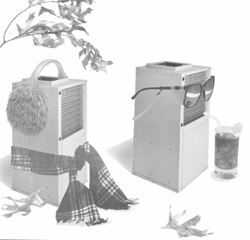Why is a Heat Pump a Good Idea?

If you're looking for ways to cut your heating bill, consider that heating and cooling account for about half of your home energy use. Also, the easiest way to take a bite out of that part of your bill is with an energy-efficient heat pump.
A heat pump is the most efficient heating machine on the market. For every dollar of electricity you put into a heat pump, you get back $2 to $4 of heat. That's energy efficiency! Plus, a heat pump also acts as a central air conditioner in summer, giving you year-round comfort.
How much do heat pumps really save?
That varies by family, of course, but if you are using an electric furnace, you should be able to save between one-half and one-third on your heating costs. You could switch to another fuel and lower your heating costs; however, you would not have the comfort of air conditioning during summer months.
How does a heat pump work?
Instead of making heat, a heat pump extracts it from the outside. Your refrigerator is a good example of a one-way heat pump. It removes heat from the air inside the refrigerator and moves it to the coils on the outside (back or bottom) of the refrigerator.
Have you ever felt the warm air that blows out from under your refrigerator when it's running? A heat pump uses this same principle-extracting heat from the air and moving it to where it's needed.
An air-to-air heat pump extracts heat from outside air. And amazingly, even in winter the air holds heat, even when the outside temperature gets down to zero degrees F.
A ground-source heat pump removes heat from the ground, which stays about 55 degrees F year-round. Loops of flexible pipe are buried in trenches four to six feet underground. The pipe is filled with a liquid that absorbs heat from the ground and transfers it inside.
Ground-source heat pumps typically cost more to install than air-to-air heat pumps, but they are the most efficient heating choice because of their heat source-the earth itself. Ground-source heat pumps also may last longer than air-to-air models. There is less wear on the compressor because they operate over a narrower range of temperatures, following the uniform ground temperatures through the year.
Do heat pumps work well in our climate?
Yes. Klickitat County has nearly ideal climactic conditions for maximum efficiency and performance.
When it is 47 degree outside, air-to-air heat pumps extract three units of energy for each unit of energy they consume. At an outside temperature of 17 degrees, they extract two units of energy for each unit of energy consumed. During more severe winter temperatures, your back-up furnace makes up the difference.
On the other hand, a ground-source heat pump does not use outdoor air as a heat source. Therefore, no back up furnace is needed and efficiencies remain high in the coldest weather.
Are heat pumps reliable?
Because they use the same process, they are about as reliable as a refrigerator. In a study of air-to-air heat pumps performed elsewhere, after 20 years more than half of the heat pumps were still in operation. Of these that had been removed, less than half were for mechanical failures. The rest were for other reasons such as changing to a newer, more efficient, or different size.
If I buy a heat pump, do I still need an air conditioner?
No! One of the biggest advantages to a heat pump is that it becomes an air conditioner in summer. Instead of moving the heat inside, it reverses operation and collects the heat from inside the house and moves it outside. All you need to do is change the settings on your thermostat. A ground-source heat pump will cool for one-half the cost of a normal air conditioner.
Don't miss out this summer by installing just an air conditioner. Install a heat pump for just a few hundred dollars more-then enjoy cooling this summer and efficient heating this winter.